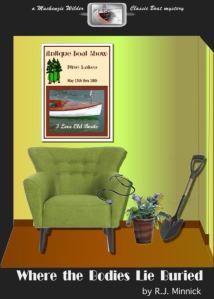Today’s guest blogger is Rochelle Campbell, author of Fury From Hell, a paranormal thriller about good versus evil. She’s worked for the New York Times and been published in Bartleby Snopes and Lit Art magazines. Rochelle is excited to reveal the cover of her upcoming third novel in this post, as well as sharing her personal insights on the writing process, mentoring writers and how to become a successful author. I have long admired Rochelle’s writing posts on Twitter, so if you want to see how irresistible, engaging tweets are done, be sure to follow her there, at her writing blog and at Goodreads. In addition, Rochelle is graciously doing a giveaway – 7 FREE copies of Fury From Hell, the first installment in the From Hell series! Be sure to enter and share this post with all your book friends. – Belinda
What’s your writing process?
My writing process leans towards the left brain once the idea for the story is formed. However, the initial inspiration for a story is as it should be – very right-brained.
I tend to like a very detailed outline that uses six points. They are:
Beginning
Introduction of Conflict
Complication of Conflict
Climax
Resolution of Conflict
Ending
I flesh out each of the six points with at least a paragraph, or two. Then, I add a major dramatic question (MDQ) for the story and/or the main character. This is what the book spins on. In other words, the theme, or underlying current running beneath the story. The MDQ addition was something I learned at the Gotham Writers Course I took this past spring. My instructor, Michael Davis, eloquently taught us that we must give our characters strong enough reasons and inner conflicts to engage them and the reader.
After the crucial portion is written down I focus on the characters, their names and relations to each other within the story world. This step will often dictate the setting and/or the environment that the story will take place in.
With all of this information, I then feel comfortable enough to begin writing. With this method, even though I know a lot about the story going in, the story and the characters still move, ebb and flow all on their own, making the writing of the story fascinating.
Have you ever considered anyone a mentor?
My writing mentor is Jacqueline Lichtenberg a phenom in the world of scifi fan fiction. Ms. Lichtenberg is a Hugo Award Winner for Best Fan Writer (1974), a Locus Award Winner for Best Science Fiction Novel (First Channel, 1981), she coined the term Intimate Adventure and is a Galaxy Award Winner Spirituality in Science Fiction for her second novel, Unto Zeor Forever. I could go on and on including that Ms. Lichtenberg is the main author of Star Trek Lives! And she is the creator of the Sime~Gen Universe, a large vibrant fanfic community.
Are you reading any interesting books at the moment?
I just completed reading Deborah Harkness’ Book of Life, the 3rd book in the All Souls series. It is a paranormal romantic thriller with aspects of horror. To set the stage, imagine the world is inhabited by humans, of course, but in and among us are other creatures that blend in – or try to – witches, daemons and vampires. There’s a Covenant the governs how these creatures can and should behave with humans and with human affairs. This series explores what happens when the Covenant is disregarded because of greed, personal gain, jealousy and power.
Currently, I am reading a friend’s children’s chapter book called, “Grandma You’re Dead!” It is the funniest premise – a 13-year-old girl is visited by her deceased grandmother who needs her grandaughter’s help to solve a 15-year-old mystery. The catch? The teenager cannot tell her mother anything, or ask anyone for help! It is already shaping up to be a sweet read.
What are some of the best tools available today for writers, especially those just starting out?
There are a myriad of tools, software, books, journals and periodicals for writers. For me, one of the best software packages for the creation of stories, and for help in structuring the story is Literature and Latte’s Scrivener. You can create a story from start to finish using this program and brainstorm ideas with it as well.
The other ‘tools’ I find most helpful are the writer’s chosen writing implements: iPad, computer, pen and paper, laptop, etc. Yes, I’m being facetious but a writer…writes. The truly important tool is to find a supportive group of writers who can provide feedback on your work during all stages. This group can help the new writer develop his/her voice and writing style while allowing the writer to express him/herself without prejudice.
Some great sites for a community of writers who can offer critique of your work are:
A writer generally develops more quickly when s/he has direct communication and connection with people of like mind.
What do you believe contributes to making a writer successful?
A writer is successful because s/he does not stop writing. It’s as simple as that. If you love writing, the act of writing, the thought of writing and all of the editing, formatting, grammar rules, punctuation and style usage best practices are all you think about then you are a successful writer. You cannot call yourself a writer if you do not write or, if you do not read. I suppose that is the philosophical answer.
The practical answer of what it takes to become a successful writer, in terms of dollars and cents (not, sense J) is a lot of work to develop your social platform. These days, if you seek literary representation, you will be asked if you have a social media platform and how large it is. While this may not be a deal-breaker for most agents, it is a major factor.
On another note, if you are an indie writer and then decide to try to publish the traditional route, your indie book sales will be reviewed and taken into consideration of whether the agent, or the publishing company will want to take you on as a client. If you book did not sell well, they know they have an uphill battle of creating a platform for you so you can sell books for them.
You can see ‘success’ can mean different things as a writer. Ultimately, you have to define what you want, set your goals and then judge your success for yourself based upon what you wanted not what someone else wanted for you.
What do you love about independent publishing?
As an independent (Indie) author I have the freedom to tell the story I want to tell without having to worry overly much about fitting into a genre, or category. I also get to choose which book covers will grace the front of my books. For me, this alone is worth the extra work of creating a book worth reading! (I hope! J)
Do you have any advice for other writers?
The only advice I can share would be to write the things that bubble out of you and slide through your fingers onto the page, or the screen.
Do not second-guess yourself. Get that first-draft pulled together without any editing from your mind. Once you have a full first draft, put it away and let it ‘rest’ for about 3 – 4 weeks. Read other books, watch movies, go on vacation; do whatever but don’t look at your manuscript.
Once you’ve let the book rest, read through it with a red pen (or whatever color you’d like). Adjust the story as you see fit and hen begin working on editing and revising. Give to your writing group, or writing partner for critique before sending to an agent, or publisher.
You’ve told us about your writing process, we touched on indie publishing and resources for writers but we don’t know who you are as a writer. Can you tell us a bit about you?
I have been writing on and off for over 20 years. To date, the off-writing portion seems to have provided fodder for the writing phase of my career as I currently have, five novel-length works in progress. Early in my career, I did legwork for The New York Times and freelanced for a number of local and regional newspapers and magazines. However, my calling – fiction writing – became apparent after my two-year writers’ mentoring course with Jacqueline Lichtenberg in the early 2000’s. From that course, several short stories emerged that readers and fellow writers urged me to develop into longer works.
After a quiescent decade, story ideas abounded and are being developed and scheduled for bringing into fully fleshed out written form.
Along the way, two short stories have been published by literary journals. They are
Chambray Curtains Blowing in the Wind
[http://www.bartlebysnopes.com/chambraycurtains.htm] and,
How Charlie Ray Saved My Life
[http://litartmag.com/issue2/story2.php].
Fury From Hell is technically my third full-length novel. I have read that a writer’s first novel (the very very very first one written on parchment paper because you were in the kitchen cooking when the idea struck…) is rarely ever publishable. You generally catch on by the 3/4/5th book! That is, unless you have help.
Book Blurb:
Fury From Hell is a paranormal thriller about good vs. evil. Here, the good is in the form of Detective Jennifer Holden, a homicide cop that is haunted by her own personal demons of a murder she committed when she was just a teenager. The trauma she suffered at the hands of social agency after agency hardened Jennifer into a staunch atheist making her gun and her bank account the only things she truly believes in.
We meet Detective Holden, shortly before she begins working on her first solo murder case. The victim is Kyma Barnes who was brutally raped and killed. As Kyma’s soul leaves her body, a demon being called by a coven of dark witches at nearby Prospect Park, is drawn to the dying woman by her death throes. Fury Abatu offers to avenge Kyma’s death. The price? The dying woman’s soul. Kyma gives it gladly to ensure the man who killed her pays dearly.
At the crime scene, Jennifer becomes possessed by Fury Abatu. Hosts usually die a violent death within weeks of the initial possession. Detective Holden does not know she is possessed…
With her own demise on the line, Jennifer must fight for her life and her very soul – something she’s not sure she even believes in – to rid herself of the dark force surrounding her and her friends.
Can Jennifer be saved from the demon? Will she be able to find the faith to believe in something greater than herself and her material things?
Read this first installment of the From Hell series to find out!
Where can readers find you?
Blog:
http://thenotebookblogairy.wordpress.com/
GoodReads:
http://www.goodreads.com/author/show/3434531.Rochelle_Campbell
Twitter:
Where can readers purchase Fury From Hell?
US: http://www.amazon.com/Fury-Hell-Rochelle-Campbell-ebook/dp/B00NE24S2W
UK: http://www.amazon.co.uk/Fury-Hell-Rochelle-Campbell-ebook/dp/B00NE24S2W


